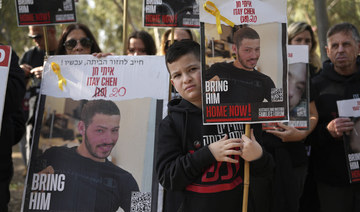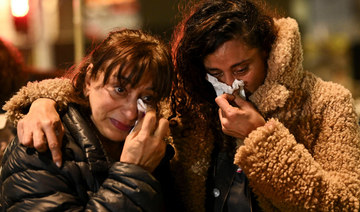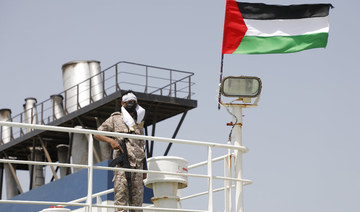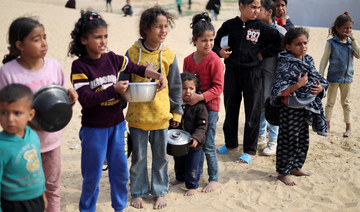GAZA STRIP: Over the last five months, Israel has killed thousands of Hamas fighters, destroyed dozens of their tunnels and wreaked unprecedented destruction on the Gaza Strip.
But it still faces a dilemma that was clear from the start of the war and will ultimately determine its outcome: It can either try to annihilate Hamas, which would mean almost certain death for the estimated 100 hostages still held in Gaza, or it can cut a deal that would allow the militants to claim a historic victory.
Either outcome would be excruciating for Israelis. Either would likely seal an ignominious end for Prime Minister Benjamin Netanyahu’s long political career. And either might be seen as acceptable by Hamas, which valorizes martyrdom.
Netanyahu, at least in public, denies there is any such dilemma. He has vowed to destroy Hamas and recover all the hostages, either through rescue missions or ceasefire agreements, saying victory could come “in a matter of weeks.”
As long as the war rages, he can avoid early elections that polls strongly suggest would remove him from power. But it seems inevitable that at some point a choice will have to be made between the hostages and military victory.
Hamas, meanwhile, appears to be in no hurry to reach a temporary ceasefire ahead of the Muslim holy month of Ramadan, which begins next week, or to delay an expected Israeli operation in Rafah, the southern city where half of Gaza’s population has sought refuge.
Hamas leader Yehya Sinwar, the alleged mastermind of the Oct. 7 attack against Israel, has reason to believe that as long as he holds the hostages, he can eventually end the war on his terms.
SINWAR’S BLOODY GAMBLE
In over two decades spent inside Israeli prisons, Sinwar reportedly learned fluent Hebrew and studied Israeli society, and he identified a chink in the armor of his militarily superior adversary.
He learned that Israel cannot tolerate its people, especially soldiers, being held captive, and will go to extraordinary lengths to bring them home. Sinwar himself was among over 1,000 Palestinian prisoners released in exchange for a single captive soldier in 2011.
For Sinwar, the mass killings on Oct. 7 might have been a horrific sideshow to the main operation, which was to drag large numbers of hostages into a vast labyrinth of tunnels beneath Gaza, where Israel would be unable to rescue them, and where they could serve as human shields for Hamas leaders.
Once that was accomplished, he had a powerful bargaining chip that could be traded for large numbers of Palestinian prisoners, including top leaders serving life sentences, and an end to the Israeli onslaught that Hamas had anticipated.
No amount of 2,000-pound bombs could overcome the strategy’s brutal logic.
Israeli officials say the tunnels stretch for hundreds of kilometers (miles) and some are several stories underground, guarded by blast doors and booby traps. Even if Israel locates Hamas leaders, any operation would mean almost certain death for the hostages that likely surround them.
“The objectives are quite contradictory,” said Amos Harel, a longtime military correspondent for Israel’s Haaretz newspaper. “Of course, you can say it will take a year to defeat Hamas, and we’re moving ahead on that, but the problem is that nobody can ensure that the hostages will remain alive.”
He added that even if Israel somehow kills Sinwar and other top leaders, others would move up the ranks and replace them, as has happened in the past.
“Israel will have a really hard time winning this,” Harel said.
Israel has successfully rescued three hostages since the start of the war, all of whom were aboveground. Israeli troops killed three hostages by mistake, and Hamas says several others were killed in airstrikes or failed rescue operations. More than 100 hostages were released in a ceasefire deal in exchange for Palestinians imprisoned by Israel.
Netanyahu says military pressure will eventually bring about the release of the roughly 100 hostages, and the remains of 30 others, still held by Hamas.
But in candid remarks in January, Gadi Eisenkot, Israel’s former top general and a member of Netanyahu’s War Cabinet, said anyone suggesting the remaining hostages could be freed without a ceasefire deal was spreading “illusions.”
It’s hard to imagine Hamas releasing its most valuable human shields for a temporary ceasefire, only to see Israel resume its attempt to annihilate the group, and Hamas has rejected the idea of its leaders surrendering and going into exile.
For Sinwar, it’s better to stay underground with the hostages and see if his bet pays off.
HOW DOES THIS END?
Netanyahu’s government is under mounting pressure from families of the hostages, who fear time is running out, and the wider public, which views the return of captives as a sacred obligation.
President Joe Biden, Israel’s most important ally, is at risk of losing re-election in November, in part because of Democratic divisions over the war. The humanitarian catastrophe in Gaza has sparked worldwide outrage. The war threatens to ignite other fronts across the Middle East.
There’s a Hamas proposal on the table in which the hostages come back alive.
It calls for the phased release of all of the captives in return for Israel’s gradual withdrawal from Gaza, a long-term ceasefire and reconstruction. Israel would also release hundreds of prisoners, including top Palestinian political leaders and militants convicted of killing civilians.
Hamas would almost certainly remain in control of Gaza and might even hold victory parades. With time, it could recruit new fighters, rebuild tunnels and replenish its arsenals.
It would be an extremely costly victory, with over 30,000 Palestinians killed and the total destruction of much of Gaza. Palestinians would have different opinions on whether it was all worth it.
A rare wartime poll last year found rising support for Hamas, with over 40 percent of Palestinians in the occupied West Bank and Gaza backing the group.
That support would only grow if Hamas succeeds in lifting the longstanding blockade on Gaza, said Tahani Mustafa, senior Palestine analyst at the Crisis Group, an international think tank.
“If this is able to bring some serious concessions that can make life just marginally better, then I think not only will this bolster support for Hamas, but it could also bolster support for armed resistance more broadly.”
Netanyahu has rejected Hamas’ proposal as “delusional,” but there is no sign the militant group is backing away from its core demands.
Israel can keep fighting – for weeks, months or years. The army can kill more fighters and demolish more tunnels, while carefully avoiding areas where it thinks the hostages are held.
But at some point, Netanyahu or his successor will likely have to make one of the most agonizing decisions in the country’s history, or it will be made for them.
The brutal logic of Hamas’ hostage strategy could deny Israel victory in Gaza
https://arab.news/vp24c
The brutal logic of Hamas’ hostage strategy could deny Israel victory in Gaza

- Netanyahu has vowed to destroy Hamas and recover all the hostages, either through rescue missions or ceasefire agreements
- Hamas, meanwhile, appears to be in no hurry to reach a temporary ceasefire ahead of the Muslim holy month of Ramadan
Iran to hold presidential election on June 28: state media

TEHRAN: Iran announced Monday it will hold presidential elections on June 28, state media reported, following the death of President Ebrahim Raisi and his entourage in a helicopter crash.
“The election calendar was approved at the meeting of the heads of the judiciary, government, and parliament,” state television said.
“According to the initial agreement of the Guardian Council, it was decided that the 14th presidential election will be held on June 28.”
US says Houthis fired ballistic missile over Gulf of Aden

- “This continued malign and reckless behavior by the Iranian-backed Houthis threatens regional stability and endangers the lives of mariners,” CENTCOM said
- The Houthis did not claim credit for any fresh assaults on Monday, but they regularly do days later
AL-MUKALLA: Yemen’s Houthi militia launched a ballistic missile over the Gulf of Aden on Sunday, the US military said.
This comes as the Houthis intensified attacks on Yemeni government soldiers around the country.
The US military said in a statement on Monday morning Yemen time that at about 9:35 p.m. (Sanaa time) on Sunday, the Houthis launched one anti-ship ballistic missile from Yemen over the Gulf of Aden, but neither the US-led coalition nor international commercial ships reported being hit by the missile.
“This continued malign and reckless behavior by the Iranian-backed Houthis threatens regional stability and endangers the lives of mariners across the Red Sea and Gulf of Aden,” CENTCOM said.
The Houthis did not claim credit for any fresh assaults on Monday, but they regularly do days later.
The Houthis’ newest missile launch is part of an escalation of missile and drone strikes against commercial and navy ships in international seas near Yemen as well as in the Indian Ocean, which the Houthis claim are in support of Palestine.
The Houthis attacked dozens of ships with hundreds of ballistic missiles, drones and drone boats during their campaign against ships, which started in November.
They also took control of one commercial ship and destroyed another.
The US military said on Saturday that a Greek-owned and operated oil tanker heading toward China in the Red Sea, flying the flag of Panama, barely avoided being struck by a ballistic missile launched by the Houthis.
Meanwhile, four Yemeni government troops were killed on Monday while battling the Houthis in the province of Taiz, bringing the total number of soldiers killed in Houthi attacks to 11 in less than a week.
Local media said that the government’s Nation’s Shield Forces engaged in heavy fighting with the Houthis in the Hayfan area, on the border between Taiz and Lahj provinces, that left four of its soldiers dead.
On Saturday, a soldier from the same Yemeni military unit was killed and another injured while defending their position in Haydan against a Houthi onslaught.
Six more Yemeni soldiers from the government’s Giants Brigades were killed on Saturday in fighting with the Houthis in the Al-Abadia region of Marib’s central province.
On Monday, the Houthis held a military burial procession in Sanaa for two of their troops killed while battling with Yemeni government forces.
The Houthis have organized similar funerals for hundreds of fighters who have died on the front lines ever since the UN-brokered ceasefire came into effect in April 2022.
At the same time, official media said that Yemen’s Defense Minister Lt. Gen. Mohsen Al-Daeri met the UN Yemen envoy’s military adviser, General Antony Hayward, in Aden on Sunday to discuss Houthi attacks on government troops across the country, peace efforts to end the war, and the smuggling of Iranian weapons to the Houthis.
Al-Daeri said that the Houthis had breached agreements with the Yemeni government and would continue to pose a danger to international maritime lines as long as they controlled Yemeni territory on the Red Sea.
He also accused Iran of continuing to supply weapons and military officers to the Houthis through direct journeys from Iran’s Bandar Abbas port to the Houthi-controlled Hodeidah port.
On Monday, UN experts, including Nazila Ghanea, special rapporteur on freedom of religion or belief, urged the Houthis to release five members of the Bahai religious minority and to stop persecuting religious minorities in regions they control.
“We urge the de facto authorities to release these five individuals immediately and refrain from any further action that may jeopardize their physical and psychological integrity,” the experts said.
Armed Houthis abducted 17 Bahais, including five women, after bursting into a meeting in Sanaa a year ago, and they have refused to release them despite local and international requests.
According to the UN experts, the Houthis released 12 Bahais under “very strict conditions” after signing a written pledge not to communicate with other sect members, avoid religious activities and not leave cities without permission, and that the Houthis continue to hold five who are at risk of mistreatment by their captors.
“We are concerned that they continue to be at serious risk of torture and other human rights violations, including acts tantamount to enforced disappearance,” the UN experts said.
Egypt mourns death of Iran’s president

- The Egyptian president expressed Egypt’s solidarity with the leadership and people of Iran during this tragic time
CAIRO: Egypt mourned the deaths of Iran’s President Ebrahim Raisi and Foreign Minister Hossein Amir-Abdollahian.
Egypt’s presidency said in a statement: “It is with deep grief and sorrow that the Arab Republic of Egypt mourns the death of the President of the Islamic Republic of Iran, Ebrahim Raisi, Iran’s Minister of Foreign Affairs Hossein Amir-Abdollahian and their escorts on Sunday in a tragic crash.
“President Abdel Fattah El-Sisi extends his sincere condolences to the people of Iran, asking Allah to envelop President Raisi and the deceased with his mercy and grant solace and comfort to their families.”
The Egyptian president expressed Egypt’s solidarity with the leadership and people of Iran during this tragic time.
Meanwhile, Egypt’s Minister of Foreign Affairs Sameh Shoukry extended his condolences to the Iranian government and people over the deaths of Raisi and Amir-Abdollahian, according to ministry spokesperson Ahmed Abu Zeid.
A helicopter carrying Raisi, Amir-Abdollahian, and several other officials crashed in mountainous terrain in the country’s northwest on Sunday. On Monday, Tehran announced the deaths of Raisi, Amir-Abdollahian, and their accompanying delegation in the crash.
Israel calls ICC prosecutor’s bid for PM arrest warrant a ‘historical disgrace’

- Katz denounced the move as a “scandalous decision” that amounted to “a frontal attack... on the victims of October 7“
- The minister added that Israel would establish a special committee to fight the ICC prosecutor’s efforts to secure a warrant
JERUSALEM: Israel on Monday slammed as a “historical disgrace” an application by the prosecutor of the International Criminal Court for an arrest warrant for Prime Minister Benjamin Netanyahu.
The prosecutor, Karim Khan, applied for arrest warrants against Netanyahu and Defense Minister Yoav Gallant as well as top Hamas leaders on suspicion of war crimes and crimes against humanity.
Foreign Minister Israel Katz said that Khan “in the same breath mentions the Prime Minister and the Minister of Defense of the State of Israel alongside the abominable Nazi monsters of Hamas — a historical disgrace that will be remembered forever.”
The prosecutor said he was seeking warrants against Netanyahu and Gallant for crimes including “wilful killing,” “extermination and/or murder” and “starvation.”
Katz denounced the move as a “scandalous decision” that amounted to “a frontal attack... on the victims of October 7” when Hamas launched their attack on Israel, sparking the Gaza war.
The minister added that Israel would establish a special committee to fight the ICC prosecutor’s efforts to secure a warrant, and also embark on a diplomatic push against it.
Katz said he planned to “speak with foreign ministers in leading countries of the world so that they oppose the prosecutor’s decision and announce that, even if orders are issued, they do not intend to enforce them on the leaders of the State of Israel.”
35,562 Palestinians killed in Gaza offensive since Oct. 7 — health ministry

- 106 Palestinians were killed and 176 injured in the past 24 hours
DUBAI: More than 35,562 Palestinians have been killed and 79,652 injured in the Israeli military offensive on Gaza since Oct. 7, the Gaza health ministry said in a statement on Monday.
One hundred and six Palestinians were killed and 176 injured in the past 24 hours, the ministry added.






















